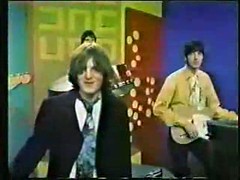 Tom Petty and the Heartbreakers via last.fm
Tom Petty and the Heartbreakers via last.fm
But it's not the best.
"Leather and Lace" has that vibe that's fallen by the wayside, you know, the one where a woman in a long dress takes you into the dell and reveals her inner truth as you stare into her eyes and fall in love. Today's female artists are in your face, competing with the men, kicking you to the curb, or so wimpy as to be disposable, completely irrelevant.
But as much as I love "Leather and Lace"'s intimate feel, its circular nature, what puts it over the top comes halfway through, when Don Henley starts to sing:
"You in the moonlight
With your sleepy eyes
Could you ever love a man like me"
This is who we wanted to be. A sweet man, with substance inside, a certain solid quality. And you could infer a sexual meaning to what I just said, and maybe that's just the point. Sex today is portrayed as rough, you take your woman, or vice versa, but reality is more about those who are self-conscious, yet are finally honest with another human being and end up connecting, coming inside.
Take that either way you want to. Metaphorically or sexually. That's just the point. When done right, sex is an opening up, a connection. But our society is too fearful to portray it that way. Movies are laden with special effects, but sometimes songs get it right. And "Leather and Lace" does.
The reason "Stop Draggin' My Heart Around" triumphs is not because of Tom Petty's vocal, however great it might be, but the riffs, the underlying song. It's Tom Petty & the Heartbreakers backing Stevie Nicks, as she reveals her frustration with a certain intimacy, that doesn't want for power.
"Baby you'll come knocking on my front door Same old line you used to use before"
Truth. She's busting him.
But that's not the complete story...
I had to go to the bathroom. Which is why I entered City Market solo. Felice, her brother and my two college buddies were ensconced in the store, deep into the belly of the beast, long after dark, when the food emporium was almost empty, except for the catatonic cashiers up front.
And I hear something in the background, over the sound system, a record playing.
It's like the song scooped me up and took me for a ride.
Suddenly, there was a bounce in my step. I'd missed the explosive opening riff. But that groove was so wide, it swallowed me whole, carried me away.
"Leather and Lace" is a great song.
"Stop Draggin' My Heart Around" is a classic.
Not something they sing on "American Idol", not something that can be sanitized and sung at pep or political rallies. It sits at the nexus of rock and roll and its audience. When the most important item you owned wasn't your cell phone, but your stereo. You came home and CRANKED IT!
Yes, I turned up "Stop Draggin' My Heart Around" so loud the neighbors freaked. But who could resist? You just wanted to get closer, you just wanted to be enveloped.
As necessary as Ms. Nicks is to this rendition, it's Tom Petty and his Heartbreakers who shine. What mutation happened on stage, in rehearsal, that made them come up with this sound? Yes, it's uniquely theirs... They listened to the same British Invasion tracks we did, but with these influences they created something unique. That nestled perfectly alongside the rest of the FM hit parade. Bands didn't go to Timbaland to get the same sound as every other outfit, they crafted their own!
"It's hard to think about what you've wanted It's hard to think about what you've lost"
You bet. That's what I told Ron the night before. Life was about closing doors. Yup, as you're watching TV, as you're wasting time, doors are shutting behind you like crazy. There goes your chance to be a movie director, there goes your chance to be a famous author, there goes your chance to have kids. They tell you life goes by fast, but they don't tell you how hard it is to accomplish a single thing. They don't tell you how hard it is to be a rock and roll star, one with a career, who lasts.
I don't want to think about what I wanted. It freaks me out to think about what I've lost. But when I heard "Stop Draggin' My Heart Around" in the supermarket Friday night my life worked. By spending those endless hours listening to the radio, the stereo, digging ever deeper, I'd come across this great record, which I'd played so many times it was in my DNA, to the point when it came over the sound system the other night it was better than being greeted by an old friend, it was like being welcomed by God.
Yup, that's what's in those rock and roll records.
Don't listen to the charlatans telling you to go to a house of worship, where you'll be instructed what you can and cannot do.
Rock and roll is a big tent. It allows all comers. Any height, any skin color. Just put on the record and turn it up. You'll see something that eludes every edition of the Bible. You'll see life itself, in all its glory, the warts and the inspiration.
Screw instant stardom. Tom Petty played more gigs in bars than most people in today's hit parade have played in their entire lives. Malcolm Gladwell said the Beatles were so good because of all that wood shedding in Hamburg? Tom Petty and his band are so freakin' great because of all those hours in Gainesville. Listening to the radio. Practicing. Gigging.
We baby boomers know the difference. Because when the Fab Four hit, we all picked up instruments, formed bands. But we gave up when it got tough, we went to college, but Tom Petty and the Heartbreakers PERSISTED!

![Reblog this post [with Zemanta]](http://img.zemanta.com/reblog_e.png?x-id=abe4ea6c-f5b4-490d-9f69-0c523208343b)

![Reblog this post [with Zemanta]](http://img.zemanta.com/reblog_e.png?x-id=0854cec5-acef-46ca-bc6c-abe1e1131115)

![Reblog this post [with Zemanta]](http://img.zemanta.com/reblog_e.png?x-id=25c74c2f-588e-4311-bee2-cec548701e73)

![Reblog this post [with Zemanta]](http://img.zemanta.com/reblog_e.png?x-id=7ef2c241-71b6-42f0-a47f-f9dafc686952)

![Reblog this post [with Zemanta]](http://img.zemanta.com/reblog_e.png?x-id=3ed33fdf-cb30-4695-b085-a82f083905ad)

![Reblog this post [with Zemanta]](http://img.zemanta.com/reblog_e.png?x-id=cc9ac4d2-026d-46c4-81a1-1f596d99e542)
![Reblog this post [with Zemanta]](http://img.zemanta.com/reblog_e.png?x-id=0b51a31d-b180-461b-b05b-33c546bb3978)














